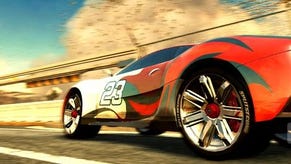Blur
He thought of cars.
Checkpoint races, the other variation, are my favourite: ostensibly all you need to do is reach the next checkpoint as quickly as possible to add more time to the clock, but in practice you need to chain nitro power-ups together and snake through sequences of stopwatch icons, alternately mastering precision at high and low speeds in the same way you did in cone challenges once upon a time (or 500 times upon a time).
Every type of event is enhanced by fan challenges, activated by cheery orange stick-men icons. You may need to navigate a sequence of gates, reach a certain speed under nitro, or barge during a drift, and while some may hold you back and others speed you up, you learn to love them all, and you want to complete them all because they reward you with extra fans and lights.
Gotham games were also famous for their leaderboards. Being 750th in the country was never compelling, and watching the best guy in the world be better than you was only worth one or two novelty ghost-car downloads, but they were definitely onto something - and then Geometry Wars 2 was a different genre, but a step in the same direction. Blur represents another advance. If you feel good about what you've just done, you can challenge certain friends to do better, and track how many attempts it takes them to do so.
You can also choose a rival from among your friends, whose scores you see every time you finish an event, and this works too: just as on-screen friend scores were a natural evolution for Geometry Wars 2 in 2008, specific comparisons make more sense in 2010 when everyone's friends list is full to the brim. Players who might have shut out the world and caned it through the campaign on launch weekend will now find themselves frequently and happily distracted.
Multiplayer shares some of these elements but is generally distinct from solo events and challenges, with a separate, longer-term ranking system that reflects the different ways people play in both contexts.
Lag hasn't been an issue on the weekend before launch, host migration is fast and the beta test rebalancing has saved us much nonsense. Left 4 Dead-style post-race awards are cute, too. (Although "punching bag" for the guy who takes the most hits is a little insult-to-injury.)
Between single-player and multiplayer modes, longevity won't be an issue - completing the campaign on Hard takes twice as long as many full-price action games, with less repetition - and Blur has a number of ways to keep you interested.
Each chapter of the campaign issues specific demands for unlocking the one-on-ones - like executing four clean, triple nitros or barging someone off a container ship into the sea. You can progress without completing these - you always have loads of events open - but the added incentives beckon you back to races for which you only have four of seven lights, while the constant accumulation of fans, and breakdown of achievement progress, means you're always on the verge of an unlockable you want.


